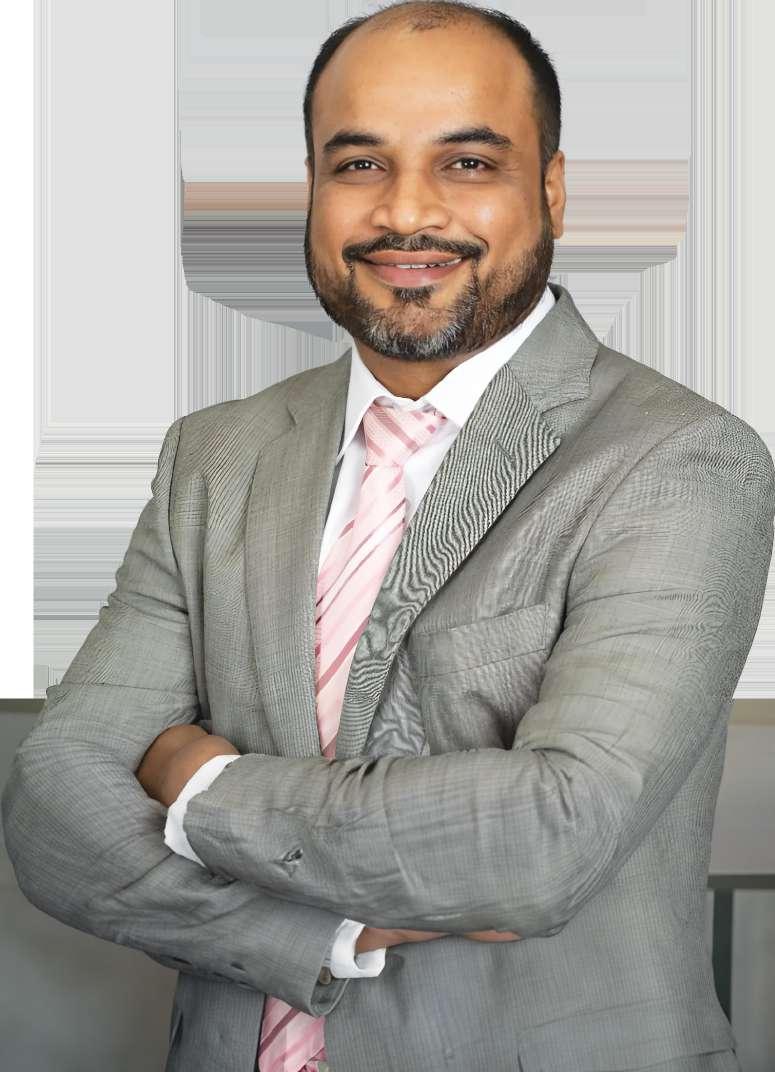
HARISH RAO
Head of Vehicle Finance Business

Editor’s Note




HARISH RAO
Head of Vehicle Finance Business



Welcome to our special edition featuring the Best Leaders from Finance in India 2024. As the financial landscape continues to evolve, the role of visionary leadership becomes ever more critical. This year, we celebrate ten exceptional individuals who have not only navigated the complexities of the global economy but have also set new standards of excellence and innovation.
These leaders have demonstrated remarkable agility and foresight in an era marked by unprecedented challenges and opportunities. They have steered their organizations through volatile markets, embraced cutting-edge technologies, and championed sustainable practices that ensure long-term growth and stability. Their stories are not just about financial success but also about inspiring change,
fostering resilience, and shaping the future of finance.
In this issue, you will delve into the journeys of these extraordinary professionals, uncovering the strategies and philosophies that have propelled them to the top. From managing multinational corporations to pioneering fintech innovations, each leader's narrative offers valuable insights into the dynamic world of finance.
We hope their experiences will inspire you, whether you're an industry veteran or an aspiring professional. These leaders exemplify the qualities that drive success in today's complex and fast-paced financial environment: vision, integrity, adaptability, and a relentless commitment to excellence.
Thank you for joining us in celebrating these outstanding individuals. Enjoy the read!
Raushan Singh Editor-in-Chief


Publisher
Editor in Chief
Editorial Team
Graphics Team
Development Team
Head Distribution
Accounts-Head
Sales Manager
Research Head Research Team
“Business Prizm magazine”, we take pride in creating original content for our readers. All materials published in our various editions are protected by copyright, and copying them for anything beyond personal use or internal reference is strictly prohibited. To use our content in any other way, we kindly request written permission from our publisher.
While we feature a variety of opinions and perspectives in our magazine, they don’t necessarily represent the official stance of “Business Prizm”, our publisher, editors, or authors. It is important to remember that neither Business Prizm nor the author(s) take responsibility for any errors that might appear or for any decisions you make based on the information.
Lata Kumari
Raushan Singh
Stephen, Anshita Bhatt, Prem
Tarun Rathor, Mahesh Sahu
Shivam Kapoor, Anoop Sharma
Karan Mishra
Diksha Singh
Abhishek Singh, Vishal
Arun Pratap
Pawan Pathak, Anupam Yadav
We encourage you to use your critical thinking skills while reading Business Prizm. The information presented should be a starting point for your own research and exploration. Business Prizm is not liable for any actions you take based on the content in our magazine.
Published & Distributed by BusinessPrizm. All Rights Reserved. Reproduction in the whole or part of India without written permission is strictly prohibited. M.R.P. 250/- [I.o.a.T]

in India 2024



V.P














Harish Rao is an accomplished finance professional with a career spanning over 25 years. He began his journey in the financial sector at Shriram Transport Finance in 1998, where he gained valuable experience in truck financing. This early role provided him with a solid foundation and ignited his interest in the financial industry. After Shriram Transport Finance, Harish Rao continued to advance in the financial sector. His tenure at SK Finance saw him rise to the position of National Business HeadCommercial Vehicle and Two Wheeler Finance, where he played a pivotal role in expanding the company’s vehicle finance operations across India. His strategic leadership led to the establishment of over 150 HUB and SPOC branches in states like Rajasthan, Madhya Pradesh, Gujarat, Maharashtra, Punjab, and Haryana. During this time, he significantly increased the company’s Assets Under Management (AUM) from 375 Cr to 3000 Cr, while also overseeing a substantial workforce expansion from 400 to 3000 employees.

Before his role at SK Finance, Harish served as Product Head for Commercial Vehicles and Assistant Vice President at Fullerton India Credit Company, where he initiated and developed the commercial vehicle business in rural India, focusing on Small Commercial Vehicles (SCV) and Light Commercial Vehicles (LCV). Prior to Fullerton, he was Senior Manager - Territory Manager at AU FINANCIERs, where he successfully established the company's business in Western Rajasthan, significantly scaling monthly business volumes and branch operations. Earlier in his career, Harish held the position of General Manager at CK Motors, contributing significantly to the growth of commercial vehicle sales across Southern Rajasthan. He also served as Senior Branch Manager at CARGO MOTORS and as Branch Product Head for Commercial Vehicles at Magma Leasing Limited, demonstrating his extensive expertise and leadership in the vehicle finance sector.

Tell us about your early career in the finance sector. What drew you to this field?
My journey in finance began in 1998 at Shriram Transport Finance, where I honed my skills in truck financing. This initial experience exposed me to the dynamic and results-oriented nature of the financial sector, which piqued my interest in pursuing a career in this field.
Building on this foundation, I joined SK Finance and quickly progressed to a leadership role as Business Head. In this capacity, I spearheaded the establishment and expansion of their vehicle finance operations across several key regions in India, including Rajasthan, Madhya Pradesh, Gujarat, Maharashtra, Punjab, and Haryana. My leadership resulted in a significant increase in their geographic reach through the creation of over 150 new branches. Furthermore, I played a crucial role in driving substantial growth in their Assets Under Management (AUM), from ₹375 Cr to ₹3000 Cr. Additionally, I am proud to have contributed to the development of their human capital, expanding their workforce from 400 to 3,000 employees. Currently, I am leveraging my extensive experience at Vastu Finserve, a Mumbai-based company. Here, I hold the position of Head Vehicle Finance Business and I am responsible for spearheading the development of their vehicle finance business. I have built a robust portfolio valued around ₹2,000 Cr. This role allows me to utilize my expertise while making a significant impact on a growing organization.
What are your core values that guide your leadership style and business decisions?
My leadership style is driven by a core set of values that prioritize both decisiveness and composure. The fast-paced nature of the finance industry, particularly in customer service and market competition, demands the ability to make prompt decisions. However, I firmly believe that these choices must be made with a cool head and a focus on long-term benefits. This ensures that our actions not only capture leads and achieve immediate goals but also contribute to sustainable success. By fostering this approach within my team, I’ve cultivated a culture that balances agility with thoughtful analysis, allowing us to navigate the market with both strategic vision and adaptability.
How do you stay informed about industry developments and adapt your
strategies accordingly?
In today’s dynamic financial landscape, staying abreast of industry developments is critical for strategic adaptation.
I employ a multifaceted approach to ensure I have a comprehensive understanding of current trends. This includes conducting thorough market research, utilizing a variety of information sources, and leveraging the expertise of my team.
Market research forms the foundation of my approach. By actively seeking out data and insights, I gain a clear picture of customer preferences, competitor strategies, and emerging financial trends. This knowledge empowers me to make informed decisions and identify potential opportunities.
Beyond traditional research methods, I prioritize staying informed through a diverse range of information sources. This includes industry publications, financial news outlets, and social media platforms. By following relevant thought leaders and engaging with industry discussions online, I gain valuable real-time perspectives on market shifts and customer sentiment.
Finally, I recognize the importance of collaboration. My product team plays a vital role in conducting market research, analyzing competitor strategies, and identifying recent trends within the financial industry. By fostering a culture of open communication and shared knowledge, I ensure that our entire team is equipped to contribute to strategic decision-making.
How do you cultivate a positive and results-oriented work environment?
Fostering a positive and results-oriented work environment is a cornerstone of my leadership philosophy. I believe a strong team is the backbone of any successful organization. Here, I prioritize a two-pronged approach: building a positive atmosphere and fostering a results-driven culture.
On the positive side, I prioritize building trust and open communication within the team. Trust is the foundation upon which effective teams are built, and it starts with me. By being transparent, approachable, and consistent in my actions and decisions, I create an environment where team members feel safe and respected. Open communication is encouraged at all levels, allowing individuals to feel comfortable sharing ideas, offering constructive criticism, and seeking support. I actively encourage collaboration and recognize the value of diverse perspectives. When team members know their voices are heard and valued, it fosters innovation and drives better decision-making.
To maintain morale, I celebrate achievements, both big and small, and express appreciation for individual and team contributions. Recognizing and celebrating
successes boosts morale and reinforces a positive work culture. Regular team-building activities, both formal and informal, help strengthen interpersonal bonds and create a sense of community and belonging. To cultivate a results-oriented mindset, I set clear and achievable goals, ensuring everyone understands how their work contributes to the bigger picture. Goal clarity is essential for aligning individual efforts with organizational objectives. I break down overarching goals into manageable tasks and milestones, providing a roadmap that guides the team’s efforts. Empowering team members with ownership of their tasks fosters accountability and drives engagement. By giving them the autonomy to make decisions and solve problems, I enable them to take pride in their work and strive for excellence.
I provide ongoing support and guidance, acting as a coach and mentor rather than a micromanager. Regular performance reviews with transparent feedback allow for course correction and continuous improvement. Constructive feedback is essential for growth, and I ensure it is delivered in a way that is supportive and actionable.
Furthermore, I utilize a balanced approach to incentives, combining financial rewards with recognition programs that acknowledge individual and team accomplishments. Financial rewards are important, but non-monetary recognition, such as public acknowledgment, awards, and career development opportunities, also play a significant role in motivating the team. By fostering a sense of purpose, accomplishment, and shared success, I motivate my team to consistently deliver exceptional results.
Looking back on your career, what accomplishment brings you the most pride?
Reflecting on my career, a source of immense pride is the significant growth trajectory I’ve experienced at SK Finance. Starting as an executive in Shriram Transport Finance Company, I consistently demonstrated a strong work ethic, dedication, and a commitment to achieving results. This commitment was recognized by my superiors, leading to progressively more challenging and impactful roles. The culmination of this journey is my current position as Head Vehicle Finance. This advancement signifies not only the value I bring to the organization but also the validation of my hard work and unwavering integrity. It serves as a testament to the power of dedication and continuous learning in achieving professional goals.



Editor’s Pick
Our oceans, covering more than 70% of the Earth's surface, are in peril. The growing menace of plastic pollution poses a significant threat to marine life, ecosystems, and even human health. Understanding the gravity of this issue and the global efforts to mitigate it is crucial for preserving our planet's blue heart.
Every year, an estimated 8 milions of plastic enter our oceans. This staggering amount primarily comes from single-use plastics, inadequate waste management, and industrial activities. Ocean currents carry this plastic debris, creating massive gyres of floating waste, like the Great Pacific Garbage Patch, which spans an area twice the size of Texas.
Plastic pollution wreaks havoc on marine life. Animals often mistake plastic for food, leading to ingestion that can cause internal injuries, starvation, and death. Sea turtles, for example, can mistake plastic bags for jellyfish, their primary food source. Entanglement in plastic debris also poses a lethal risk to species like seals and seabirds. Moreover, the degradation of plastics into microplastics disrupts marine food webs, affecting even the smallest organisms. The impact of plastic pollution extends to human health and the economy. Microplastics have infiltrated our seafood and water supplies,
posing potential health risks. Chemicals from plastics, such as BPA and phthalates, are linked to various health issues, including hormonal disruptions and cancers. Economically, plastic pollution costs billions in cleanup efforts and lost tourism revenue for coastal communities.
Combatting plastic pollution requires a concerted global effort. International agreements, like the Basel Convention, aim to reduce plastic waste. Countries like Kenya and Rwanda have implemented strict bans on plas- tic bags, showcasing successful reduction strategies.
Innovative technologies, such as The Ocean Cleanup project, use advanced systems to remove plastic from the oceans. Grassroots initiatives and community cleanups also play a vital role in mitigating pollution.
Individuals can make a significant impact by reducing their plastic use. Opting for reusable items, supporting sustainable brands, and participating in local cleanups are effective actions.
Advocacy for stricter regulations and supporting organizations dedicated to ocean conservation are also crucial.
The fight against plastic pollution is a collective responsibility. By adopting sustainable practices and advocating for change, we can protect our oceans for future generations. The time to act is now, for the health of our planet and all its inhabitants.



Mitul Doshi, currently Vice President of Finance at Shopse Digital Finance, a leading fintech company specializing in digital financial services. With a strong background in finance and a proven track record in the industry, Mitul plays a pivotal role in overseeing the financial operations and strategies of the company. Mitul’s career is marked by extensive experience in financial management, strategic planning, and operational excellence. Before joining Shopse Digital Finance, he held Senior Leadership positions in Finance for prominent organizations across diverse sectors such as AdTech, Tech, SaaS, CRM, and Fintech, where he demonstrated his expertise in driving financial growth, optimizing processes, and ensuring compliance with regulatory requirements. Mitul is known for his analytical acumen and strategic mindset, which enable him to navigate complex financial landscapes and deliver actionable insights. He is adept at
leveraging technology to streamline financial processes and improve efficiency. His ability to lead cross-functional teams and foster collaboration across departments has been crucial in driving Shopse Digital Finance’s success.
Can you walk me through your career trajectory and what led you to your current role?
Over the past 15 years, I’ve focused on Strategic Finance and Business Leadership, specializing in driving organizational growth, ensuring operational excellence, and optimizing financial health across diverse sectors such as AdTech, Tech, SaaS, CRM, and Fintech. Early in my career, I developed a keen interest in aligning financial strategies with broader organizational goals. This passion led me to champion initiatives that not only enhanced profitability but also fostered sustainable growth. My approach has always been centred around implementing strategic visions, optimizing global financial management practices, and spearheading initiatives that drive efficiency and mitigate risks. Throughout my professional trajectory, I have continually sought opportunities to innovate within
financial processes, leveraging automation to improve accuracy and streamline operations. This commitment to excellence in financial management has been pivotal in supporting the financial stability and success of the organizations I have served.
Today, as a Strategic Finance and Business Leader, I have the privilege of using my experience and skills to guide organizations through intricate financial landscapes, ensuring they thrive in dynamic markets. My path to this role has been driven by a commitment to excellence, a passion for strategic thinking, and a dedication to delivering tangible value through sound financial management.
In the last decade or two, what are some of the biggest transformations you’ve witnessed in the financial sector?
In the last decade or two, the financial sector has undergone significant transformations. Finance has evolved from basic data entry and audits to becoming trusted advisors for CEOs and management. Finance leaders now play a crucial role in data-driven decisionmaking and automating manual processes, which profoundly impact organizational strategies and operations.
Another major transformation is the increased recognition and importance of knowledge and skills in the finance sector. This shift is particularly noticeable in startups, where hands-on experience and foundational work are essential for developing successful finance departments and establishing data-driven organizational practices. As the saying goes, “Do not chase success; pursue excellence, and success will follow.
How do you balance the need for short-term profitability with long-term growth?
Balancing the need for short-term profitability with long-term growth requires a strategic approach. Shortterm profitability is important as it influences future outcomes, but sustainable long-term growth hinges on incremental, meaningful progress. In a startup, rapid expansion can sometimes come at the cost of immediate profitability, posing risks in volatile markets. It’s crucial to understand that not all growth paths offer the same benefits. Therefore, a thorough analysis of various growth opportunities is vital, considering factors like competition, regulatory hurdles, market size, and scalability. This balanced approach ensures that short-term gains bolster sustainable longterm growth, promoting stability and success in dynamic business landscapes.
What are your thoughts on the growing importance of environmental, social, and governance (ESG) investing?
ESG criteria are increasingly influencing investment decisions due to their impact on long-term financial performance and risk management. Integrating ESG into their business models is not only strategic but also essential for enhancing operational resilience, meeting regulatory expectations, and fostering stakeholder trust. India’s extensive coastlines and large population make it particularly vulnerable to climate risks like heat waves, flooding, and air pollution, which affect agriculture, water supply, and public health. To address these challenges, India aims to reduce carbon intensity by 45% by 2030.
Embedding ESG principles into financial strategies isn’t just about compliance; it’s about proactively managing risks associated with climate change, supporting sustainable development goals, and creating lasting value for investors and society as a whole.
What hobbies or interests do you enjoy outside of the office that help you maintain a well-rounded life?
I believe in pursuing a well-rounded lifestyle and culminate habits that contribute to personal growth and balance. Playing cricket, going to the gym, and spending quality time with my family are indeed a significant part of my life, and they’ve had a profound impact on my leadership style.Cricket is a team sport that emphasizes collaboration, communication, and strategic thinking. On the field, every player’s role is crucial, and success depends on working together towards a common goal. This mirrors the collaborative efforts needed in the financial department, where teamwork and effective communication are key to achieving our objectives. The camaraderie and mutual support in cricket are experiences I bring to my professional team dynamics. Going to the gym instils a sense of discipline and commitment in me. This routine helps me stay focused and maintain high standards in my professional responsibilities. It’s about setting goals, working towards them consistently, and not giving up. Spending quality time with my family is perhaps the most grounding aspect of my life. It teaches me the importance of work-life balance. In a high-pressure roles, it’s essential to prevent burnout and maintain overall well-being. Prioritizing family time helps me recharge and come back to work with renewed energy and perspective.



Abhilash P V serves as the Executive Vice President of Finance at NG-Next Tech
Private Limited. With a robust background in financial management and strategic planning, Abhilash has been instrumental in steering the financial direction of the company. Having graduated from IIM Bangalore and being a Chartered Accountant, coupled with his experience at one of the leading Big4 firms, he has demonstrated exceptional skills in optimizing financial performance, enhancing operational efficiencies, and driving organizational growth.
At NG-Next Tech, Abhilash oversees all financial operations, including budgeting, forecasting, financial reporting, and risk management. He plays a pivotal role in aligning financial strategies with the company's long-term objectives, ensuring sustainable growth and profitability. His leadership in financial planning and analysis has significantly contributed to the company's competitive positioning in the tech industry.

What is your leadership philosophy, and how would you translate it in leading the Finance team?
My leadership philosophy is based on two pillars. The first pillar emphasizes replacing the fear of failure with a hunger for success. Individuals often fear the consequences of failure rather than failure itself. As a leader, it is crucial to protect your team's minds from these consequences, fostering an environment where they can thrive without fear.The second pillar involves delegating both responsibility and authority. Trust and faith in your team are essential. Avoid micromanagement by ensuring that delegation is accompanied by the necessary authority, enabling your team to operate autonomously and confidently.Finance in most organizations is often viewed as a cost center, it’s important to highlight the significant impact of their work on the organization. Recognize and celebrate successes, whether it's meeting deadlines or maintaining low variances. Clear communication about their contributions to the organization’s overall success is vital to boost their confidence and drive.

Describe your approach to financial reporting and ensuring transparency for stakeholders.
I believe that financial health is the heart of every organization. Just as the heart is vital to human life, financial inflows and outflows are critical to a company's sustainability. Employees, investors, customers, and suppliers
all rely on a company's financial integrity. Therefore, it is imperative to project the financial health of a company with sound ethics and transparency.
Historical financial scandals underscore the importance of ethical financial reporting. Stakeholders must be given the opportunity to make informed decisions based on complete and accurate information. This requires adherence to accounting and auditing standards, ensuring all relevant information is disclosed without omission or distortion.Two key elements in financial reporting are robust disclosures and organizational structure. Disclosures, including footnotes, should be thorough and clear, enhancing transparency. It is also crucial to promote financial literacy among stakeholders, enabling them to understand these disclosures effectively.
Organizational structure plays a significant role in preventing financial reporting malpractices. The fraud triangle identifies pressure, opportunity, and incentives as key motivators for fraud. To mitigate these risks, duties should be segregated, and enough flexibility should be provided to employees to prevent shortcuts. This structural integrity ensures accurate and transparent financial reporting.

Beyond financial metrics, how do you measure the success of the Finance department in a broader business context?
Beyond financial metrics, the success of the Finance department in a broader business context can be measured through several key aspects.First is risk management, which includes strong internal controls, compliance with regulations, fraud prevention, and managing market fluctuations. Ensuring IT security, backup, and recovery is also crucial due to the reliance on digital financial data. Second, the Finance department's strategic insight and collaboration with other functions and top management are vital. The involvement of finance in both rudimentary and strategic decision-making indicates its importance to organizational success.
Third, efficiency is essential, reflected not just in margin improvements but also in resource allocation and staff planning. Adopting a product function culture with regular planning and review can enhance efficiency and support growth.Finally, managing repetitive processes through automation and staff training minimizes the need for managerial intervention. Utilizing technology like AI and machine learning can streamline operations, allowing finance leaders to focus on higher-level strategic tasks.These aspects—risk management, strategic insight, efficiency, and process automation—comprehensively measure the Finance department's success within the organization.

How would you leverage the Finance department's expertise to support strategic decision-making throughout the company?
To leverage the Finance department's expertise in supporting strategic decision-making, the process involves three steps: evaluation, measurement, and control. During evaluation, the Finance team gathers market data, understands business models, and assesses competitors. They then make corroborative assumptions based on multiple information sources and develop financial models. Sensitivity and scenario analyses are performed to gauge the impact of external variables, leading to resource allocation and cost modeling. For short-term projects, this involves pricing strategies, while long-term projects require capital budgeting to assess cost recovery. Measurement involves the Finance team utilizing company-wide data to create meaningful KPIs. Instead of relying on traditional metrics, the team should perform root cause analysis to identify true outcome drivers and establish innovative KPIs that are regularly monitored. Control is the final step, where outcomes are compared to the initial plan. Any variances are identified, and corrective actions are taken in consultation with relevant teams.By excelling in these areas, the Finance department significantly contributes to the company's strategic decisions and overall growth.

How can financial leadership be a driver of diversity and inclusion within the Finance team and across the company?
Financial leadership can drive diversity and inclusion (D&I) by recognizing its hidden value beyond measurable top-line and bottom-line metrics. Engaging in D&I initiatives, like offering additional leave to female employees, fosters trust, loyalty, and higher retention rates, ultimately enhancing efficiency and reducing costs. These benefits, although not directly quantifiable, contribute significantly to organizational success.Collaboration between Finance and HR is crucial. HR's understanding of organizational psychology and motivation theory can guide Finance in implementing balanced D&I policies that maximize positive impact without excessive costs. Furthermore, finance leaders can advocate for D&I initiatives during company-wide meetings, leveraging their influential position to signal the importance of inclusivity. By emphasizing D&I, finance executives can inspire the organization to adopt diverse thinking and equitable treatment, ultimately fostering a more inclusive and productive workplace.


Chief Financial Officer and CHRO
Zolo
Sidhartha Mehra serves as the Chief Finan cial Officer (CFO) and Chief Human Re source Officer (CHRO) at Zolo, a leading company in the lodging and hospitality industry based in HSR Layout, Karnataka. Bringing a wealth of experience, Sidhartha previously held significant roles at Jupiter Capital from 2014 to 2019, where he was CFO, Investment & Direc tor, enhancing financial planning and strategic decision-making. His tenure at GE Capital from 2005 to 2009 and 2011 to 2014 included roles such as Financial Planning & Analysis Leader and Commercial Finance Head, where he excelled in business performance analytics, financial planning, and risk management. At Barclays India from 2009 to 2011, Sidhartha contributed as the Business Performance & Analytics Head, driving efficiency and growth. His multifaceted experience underscores his capability to manage both financial intricacies and human resource dynamics, significantly contributing to Zolo’s mission of transforming the hospitality landscape.

The CFO and CHRO roles offer valuable insights into different aspects of our business. How do you leverage the strengths of each role to create a more holistic approach in our organization? Effective leadership hinges on inspiring and guiding a team towards a shared vision. This requires setting a clear direction, aligning everyone with the organization's mission, and fostering a culture of integrity, collabora

tion, and accountability. An interesting concept is a leader who embodies the combined roles of CFO and CHRO. This perspective offers a unique advantage by strengthening strategic alignment, decision-making, and overall organizational health.Traditionally, the CFO safeguards financial resources while the CHRO cultivates human capital, the most valuable asset of any company. By combining these roles, leaders gain a deeper understanding of how investments in people directly impact financial outcomes. This allows for a seamless integration of financial goals with employee development initiatives. Furthermore, a unified leader can make quicker decisions, improve organizational agility, and implement change management more efficiently. Additionally, they can create balanced scorecards that measure success not just through financial metrics, but also by employee satisfaction, engagement, and retention.

With such distinct focuses, how do you foster open communication and collaboration between finance and human resources?
To promote seamless collaboration, I prioritize open communication. Weekly meetings with direct reports encourage transparency, where leaders discuss challenges and dependencies. Monthly newsletters and team meetings keep everyone informed and aligned. Bi-annual team offsites strengthen connections and foster collaboration.
My approach to business reviews takes a holistic view by involving all teams. These reviews enhance understanding of interdependencies and encourage co-ownership of key goals like headcount, hiring costs, and productivity. Overall, my leadership focuses on aligning team members with the company's vision and clarifying their role in achieving goals.

How do you navigate financial uncertainty or economic downturns in your strategic planning?
Business uncertainty and unforeseen risks are inevitable. Effective leadership requires a strategic approach to navigate these challenges. The first step is acknowledging the inherent uncertainty and unknowns, while simultaneously recognizing the limitations of complete control. Embracing these limitations fosters a collaborative environment where teams can work together to find solutions. Furthermore, agility and adaptability are paramount, as successful strategies may need to evolve alongside the changing landscape. Maintaining composure during periods of downturn is crucial, allowing for clear-headed decision making. Flexibility is key, as rigid
adherence to predetermined solutions may hinder progress. A strong understanding of not only what to do, but also what to avoid, empowers effective decision-making. Viewing challenges as opportunities for innovation can fuel creative problem-solving. Finally, maintaining a focus on the task at hand and prioritizing financial security through judicious investments ensures the organization is well-positioned to weather the storm.

How do you prioritize financial investments and resource allocation?
As CFO, effective capital allocation is crucial for driving growth. I prioritize strategic alignment of investments with our short and long-term goals. Capital is allocated judiciously to initiatives that capitalize on our strengths or enhance our competitive position. Each project undergoes rigorous evaluation based on criteria like payback period and ROI to ensure optimal use of resources. Risk-reward profiles are carefully assessed, with clear ownership and accountability established. Collaboration with stakeholders ensures transparency and alignment throughout the process. We maintain flexibility by regularly reviewing investments to ensure they align with our strategic objectives and avoid persisting with underperforming projects.
Additionally, we maintain a capital buffer to seize unforeseen opportunities or tackle challenges effectively. These principles guide our decisions, ensuring they not only enhance financial performance but also propel us toward our strategic vision.

How do you approach ethical dilemmas or challenges related to financial governance?
As CFO, I prioritize fulfilling fiduciary duties with a strong commitment to ethical governance. Effective risk management is central, achieved through proactive identification and mitigation of key governance and compliance concerns. Our structured framework of controls, policies, and procedures ensures organizational safeguarding. Beyond compliance, I empower employees with defined roles, fostering innovation within established boundaries.Ethical leadership is core to my approach, promoting integrity and accountability. I lead by example in ethical decision-making, rejecting proposals that compromise our values despite external pressures. Continuous learning keeps me informed of regulations and industry standards, ensuring ongoing effectiveness. I advocate for a flexible governance approach to navigate evolving landscapes. Throughout, personal integrity guides me, ensuring actions consistently meet the highest ethical standards.

The traditional 9-to-5 job is no longer the sole path to a successful career. The rise of the gig economy has fundamentally changed how people work and businesses operate. This environment, marked by short-term contracts and freelance work, is transforming the workforce.
Technology drives the gig economy. Online platforms connect businesses with skilled individuals, eliminating geographical limitations and streamlining hiring. Platforms like Uber and Upwork empower individuals to leverage their skills and build their own schedules. The gig economy offers advantages for both workers and businesses. Workers enjoy greater flexibility and autonomy, choosing projects that align with their interests and skills. Businesses access a wider talent pool on a project-by-project basis, reducing full-time employee costs. However, the gig economy also presents challenges. Workers often lack job security and benefits like health insurance and paid leave. Income can be unpredictable, and navigating taxes and legal complexities can be daunting. Some platforms lack regulations, raising concerns about fair pay and worker exploitation. The gig economy is here to stay, but it's likely to evolve. As technology advances, more special-

ized platforms may emerge, catering to specific industries and skills. Additionally, regulations may be introduced to provide greater protection and benefits for gig workers.
For individuals, embracing lifelong learning is crucial in this dynamic environment. Honing existing skills and acquiring new ones will help them stay competitive and navigate the ever-changing market. Businesses need strategies to attract and retain talent in this flexible work environment. Offering competitive rates, fostering a positive work experience, and providing opportunities for skill development can be key differentiators.
The gig economy presents both opportunities and challenges. As individuals and businesses navigate this evolving landscape, focusing on flexibility, adaptability, and continuous learning will be crucial for success. The future of work is likely to be a hybrid model, blending traditional employment and gig work arrangements. Embracing the advantages while mitigating the downsides will be key. The gig economy revolution is ongoing, and its ultimate impact on the workforce remains to be seen. However, the way we work is changing, and it's up to us to adapt and thrive in this new era.



RAJESH R. SONI Head - Finance & Accounts T AND T INFRA LIMITED
Rajesh Soni, a distinguished finance professional at T&T Infra Limited, leverages his expertise in financial management and strategic planning to drive company growth. Drawn to the field's dynamic influence on performance, Soni excels in analytical thinking and problem-solving. The infrastructure sector presents unique challenges, including government regulations and acquisition delays. He recognizes the vast opportunities in India's expanding infrastructure, fueled by government investment. Embracing technological advancements, Soni recognizes the importance of AI, machine learning, and cloud systems to optimize data processing and decision-making. He fosters a collaborative and efficient finance team through clear goals, defined roles, and continuous learning.
Soni's strategic vision, technological fluency, and leadership make him a key asset to T&T Infra Limited continued success.

What initially drew you to the field of finance and accounting?
The intricate link between financial decisions and a company's performance has always captivated me. The finance and accounting field not only provides a comprehensive understanding of business operations, but also empowers me to actively participate in shaping strategic direction. This dynamic environment thrives on a blend of analytical thinking and strategic problemsolving, fostering a passion for continuous learning and keeping me constantly engaged. In essence, finance allows me to translate financial data into actionable insights that drive strategic decision-making, ultimately propelling the company towards sustainable growth.
What are some of the unique challenges

and opportunities in the infrastructure sector compared to other industries you've worked in?
The Indian infrastructure sector, while crucial for economic growth, faces distinct challenges. Government policies and regulations heavily influence project development, often leading to delays due to land acquisition complexities and a lack of streamlined approvals. Additionally, a skilled labour shortage and budgetary constraints can hinder progress. Despite the implementation of GST, uncertainties in tax administration further discourage private investment. However, immense opportunities abound. Government initiatives and increased budgetary allocations are driving unprecedented growth. India boasts significant potential in roads, railways, airports, renewable energy, and healthcare infrastructure. These advancements will not only create jobs and improve supply chains but also attract foreign investments, stimulating the economy. Major infrastructure plans like Bharatmala, Sagarmala Pariyojana and UDAN showcase the government's commitment to building a robust network. Encouraging private participation through incentives can bridge the financing gap and foster innovation, leading to a futureproof infrastructure sector that propels India towards becoming a global economic powerhouse.

have technological
impacted the field of finance and accounting in your experience?
The ever-evolving business landscape demands a strategic integration of technology for long-term success. The COVID-19 pandemic highlighted this need, as technology enabled remote work and business continuity. Today, advancements like digitization and process automation powered by AI and machine learning are crucial for corporations. These technologies facilitate real-time data processing and reporting, enabling the analysis of massive datasets to identify trends and predict future outcomes with high accuracy. This ultimately empowers informed financial decision-making. Cloudbased accounting systems are another game-changer, providing unrestricted access to critical data anytime, anywhere. In today's world, navigating the complexities of finance requires constant access to information and reports. Technological advancements are not just an option, but a necessity for building sustainable business strategies. They have streamlined complex processes, sparked innovation, and become a true game-changer in the field of finance and accounting.

What are your key strategies for fostering a collaborative and efficient finance team?
In today's dynamic environment, fostering a collaborative and efficient finance team requires a multi-pronged approach. First, I prioritize creating a shared vision and setting clear goals. When everyone understands the team's purpose and objectives, individual efforts naturally align towards achieving them. Second, I ensure well-defined roles and responsibilities. This eliminates confusion and fosters ownership among team members. Third, I promote inclusivity by valuing diverse perspectives and encouraging open communication. Building trust through transparent communication is also crucial. Finally, I believe in continuous learning and development. By providing training opportunities and encouraging innovation, I empower my team to stay ahead of the curve. Recognition and celebration of achievements further fuel motivation and unlock the team's full potential, propelling the organization towards its long-term goals.

How do you maintain a healthy worklife balance with your demanding career?
Maintaining a healthy work-life balance in a demanding field like finance requires constant effort and a multifaceted approach. While the fast-paced nature of the job can make it challenging, I've found several strategies that help. Firstly, meticulous planning and prioritization are key. I create daily to-do lists, focusing on the most critical tasks first. Secondly, delegation is essential. Empowering team members with ownership over specific tasks frees up my time for strategic decision-making. Regular breaks are crucial for mental clarity and focus. I also recently incorporated mindfulness practices to manage stress and improve overall well-being. Technology plays a vital role too. Utilizing tools for quick reports and streamlined decision-making allows me to be more efficient. Finally, maintaining physical fitness through regular workouts helps me de-stress and improves my overall energy levels. By implementing these strategies, I can achieve a better work-life balance, allowing me to be more effective both professionally and personally.


In the ever-evolving world of finance, where precision, foresight, and strategic thinking are paramount, Abhilash Raghavan stands out as a beacon of excellence. As the Chief Financial Officer (CFO) of ANSR, a global leader in helping enterprises build and manage high-impact engineering and innovation teams, Raghavan's journey is a testament to the transformative power of financial acumen and strategic leadership.
Abhilash Raghavan's path to becoming a distinguished finance professional began with a solid foundation in education. Born in India, Raghavan displayed an early aptitude for numbers and problem-solving. He pursued a Bachelor’s degree in Commerce from a reputable university, where he graduated with honors. His academic journey continued with a Chartered Accountancy (CA) qualification from the Institute of Chartered Accountants of India (ICAI), which is renowned for its rigorous training and high standards.
Raghavan's thirst for knowledge did not stop there. Recognizing the
importance of global perspectives in finance, he pursued an MBA from a prestigious international business school. This combination of technical proficiency and strategic insight laid the groundwork for his future success.
Raghavan's experience was instrumental in honing his skills in financial analysis, risk management, and regulatory compliance. Working with a diverse portfolio of clients, Raghavan gained invaluable insights into various industries, preparing him for the multifaceted challenges he would later face.



His early career was marked by a series of rapid advancements, each role providing a broader scope of responsibilities and deeper engagement with financial strategy. Raghavan's ability to navigate complex financial landscapes with ease and his knack for turning challenges into opportunities quickly earned him a reputation as a rising star in the finance sector.
In 2015, Raghavan joined ANSR, a pivotal move that would define the next phase of his career. ANSR, known for its innovative approach to building and operating global capability centers (GCCs) for enterprises, was at a stage where strategic financial leadership was crucial for its growth and expansion. Raghavan's expertise in financial planning, analysis, and strategic management made him the ideal candidate to steer the company's financial ship.
As the CFO of ANSR, Raghavan has been instrumental in driving the company’s financial strategy and operations. His leadership style, characterized by a blend of analytical rigor and strategic vision, has been pivotal in ANSR's success. Under his stewardship, ANSR has seen significant growth, expanding its footprint across various geographies and industry verticals.
One of Raghavan's key contributions has been his role in optimizing ANSR's financial structure. He implemented robust financial controls and processes, ensuring that the company operates with maximum efficiency and transparency. His approach to financial management is holistic, encompassing everything from budgeting and forecasting to risk management and compliance.
Raghavan's strategic initiatives have also played a crucial role in ANSR's expansion efforts. He has been at the forefront of securing funding for new projects, negotiating key partnerships, and driving mergers and acquisitions. His ability
to align financial strategy with the company’s overall business goals has been a cornerstone of ANSR's sustained growth.
One of the hallmarks of Raghavan's tenure at ANSR has been his innovative approach to financial management. He has embraced technology and data analytics to drive decisionmaking processes. By leveraging advanced financial modeling and predictive analytics, Raghavan has provided ANSR with deeper insights into market trends, helping the company stay ahead of the curve.
Raghavan's forward-thinking approach is also evident in his commitment to sustainability and corporate social responsibility (CSR). He has championed initiatives that align ANSR’s financial goals with environmental and social objectives, ensuring that the company’s growth is sustainable and inclusive.
Raghavan’s journey at ANSR has not been without challenges. The rapidly changing business environment, economic fluctuations, and the global pandemic posed significant hurdles. However, his resilience and adaptability have been key to navigating these challenges successfully. During the COVID-19 pandemic, Raghavan played a crucial role in ensuring business continuity, implementing cost-saving measures, and securing the financial health of the company.
His achievements at ANSR have not gone unnoticed. Raghavan has been recognized with several awards and accolades for his contributions to the field of finance. His leadership has set a benchmark for financial excellence, inspiring the next generation of finance professionals.



Cricket fans across the globe witnessed history in the making as Team India scripted a remarkable journey to clinch the coveted T20 World Cup 2024 title. The victory, achieved in Barbados, marked the culmination of a dominant campaign where the Men in Blue remained unbeaten throughout the tournament. This triumph not only ended India's 13-year wait for a major ICC trophy but also etched their name in the record books for achieving an unprecedented feat – winning the World Cup without dropping a single game.
The architects of this historic win were a combination of experience and youthful exuberance. Captain Rohit Sharma, leading by example, provided stability at the top of the order. His astute captaincy decisions, along with the team management's focus on building a well-balanced squad, proved pivotal. The batting line-up displayed remarkable depth, with youngsters like Shivam Dube and Rishabh Pant complementing the seasoned campaigners like
Suryakumar Yadav and Virat Kohli. The bowling attack, spearheaded by the lethal pace duo of Jasprit Bumrah and Arshdeep Singh, was equally potent, consistently stifling opposition batsmen. The emergence of all-rounder Axar Patel, who chipped in with crucial wickets and handy cameos with the bat, further bolstered India's strength.
The tournament witnessed individual brilliance as well. Virat Kohli, overcoming a lean patch in recent times, silenced his critics with a matchwinning knock in the final. His vintage knock, reminiscent of his peak form, served as a fitting farewell to the format, as he announced his retirement from T20 internationals after the tournament. Jasprit Bumrah, with his trademark accuracy and pace, emerged as the Player of the Tournament, showcasing his mastery in the shortest format. Young prodigy Arshdeep Singh, meanwhile, broke records by claiming the most wickets (17) in a single T20 World Cup edition, announcing himself as a future star.
India's Campaign in the T20 World Cup 2024
India's journey to the top was paved with remarkable performances and unforgettable moments. The campaign kicked off with a series of wins that showcased their dominance in the format. Notably, Rohit Sharma's blistering 92 off 41 balls against Australia at the Daren Sammy National Cricket Stadium in St. Lucia set the tone for India's winning streak. The match against Afghanistan was another highlight, with Suryakumar Yadav's swift 53 off 28 balls leading to a 47-run win. Even when faced with an abandoned match against Canada, the team's morale remained high.
Match, while Jasprit Bumrah's 15 wickets in the tournament secured him the Player of the Series.
The victory brought immense joy to the Indian cricket fraternity, marking the end of a long wait for an ICC trophy, a period filled with near misses in major tournaments. The team's resilience and unwavering determination throughout the campaign resonated deeply with fans, making the victory even sweeter. This triumph also signifies the dawn of a new era in Indian cricket. With a blend of experienced veterans and exciting young talents, Team India


The final against South Africa at Kensington Oval in Bridgetown, Barbados, on June 29th, was a nail-biter. India set a target of 177, and despite a valiant effort from South Africa, they fell short by 7 runs. Virat Kohli's crucial 76 off 59 balls earned him the Player of the
has positioned itself as a force to be reckoned with in the T20 arena for years to come. The 2024 T20 World Cup will forever be etched in cricketing folklore as a testament to India's dominance and a defining moment for a team hungry for global glory.


Soundar Raj is a distinguished finance professional serving as the Chief Financial Officer (CFO) and a Board Member at NXP India. With a career spanning several decades, Raj has established himself as a leading figure in the financial sector, renowned for his strategic acumen, leadership qualities, and a deep understanding of the intricacies of corporate finance.
Soundar Raj's journey in the world of finance began with a strong academic foundation. He completed his undergraduate studies in Commerce, laying the groundwork for his future career. His passion for finance led him to pursue further education, culminating in a Chartered Accountancy (CA) certification, one of the most prestigious qualifications in the field. This rigorous training equipped him with a comprehensive understanding of financial management, auditing, taxation, and corporate laws.
Raj's professional journey began at one of the Big Four accounting firms, where he honed his skills

in auditing and financial consulting. This early experience provided him with invaluable insights into the financial operations of diverse industries and the complexities of regulatory compliance. His ability to navigate these complexities with ease soon caught the attention of industry leaders, paving the way for his rapid ascent in the corporate world.
Soundar Raj's career trajectory took a significant leap when he joined a leading multinational corporation as a senior financial analyst. In this role, he demonstrated exceptional analytical abilities and a strategic mindset, contributing to the company's financial planning and analysis functions. His knack for identifying growth opportunities and optimizing financial performance earned him accolades and promotions.
Raj's most notable professional achievement came when he was appointed as the CFO and Board Member of NXP India, a subsidiary of NXP Semiconductors, a global leader in semiconductor manufacturing. In this capacity, Raj oversees the financial operations of the company, ensuring robust financial health and compliance with global standards.
As CFO, Raj has been instrumental in driving NXP India's financial strategy, focusing on sustainable growth and profitability. He has led initiatives to streamline financial processes, enhance cost efficiency, and implement advanced financial technologies. Under his stewardship, the company has witnessed significant improvements in financial reporting accuracy and timeliness, contributing to better decision-making at the executive level.
Soundar Raj's strategic vision extends beyond conventional financial management. He is a proponent of leveraging technology to drive financial transformation. At NXP India, he has championed the adoption of digital tools and analytics to enhance financial planning, forecasting, and risk management. His forward-thinking approach has positioned the company to navigate the challenges of a rapidly evolving business landscape effectively.
Raj's leadership style is characterized by a commitment to transparency, accountability, and ethical governance. He fosters a culture of open communication and collaboration within the finance team, encouraging innovation and continuous improvement. His ability to inspire and mentor young finance professionals has contributed to a highly skilled and motivated workforce at NXP India.
"I consider leadership an essential skill required to build a solid career in finance. I aim to really lead with wisdom. That means to lead with compassion and empathy, even when mistakes are made.
As a Board Member, Soundar Raj plays a crucial role in shaping the company's corporate governance framework. He advocates for robust internal controls, risk management practices, and adherence to regulatory requirements. His insights into financial and operational risks have been pivotal in guiding the board's strategic decisions and ensuring the long-term sustainability of the business.
Raj's expertise in corporate governance extends to his involvement in various board committees, including the Audit Committee and the Risk Management Committee. In these roles, he provides valuable oversight and guidance on matters related to financial integrity, compliance, and risk mitigation. His contributions have earned him the respect and trust of his peers and stakeholders.
Soundar Raj's contributions to the finance industry have not gone unnoticed. He is a sought-after speaker at industry conferences and seminars, where he shares his insights on topics such as financial transformation, corporate governance, and the impact of digital technologies on finance. His thought leadership articles have been published in leading financial journals, further cementing his reputation as an authority in the field.
Raj's achievements have been recognized with numerous awards and accolades. He has been featured in lists of top CFOs and finance leaders, highlighting his exceptional contributions to the profession. His ability to drive financial excellence while navigating complex business environments has set him apart as a role model for aspiring finance professionals.
At the core of Soundar Raj's professional success is a strong set of personal values. He believes in the importance of integrity, diligence, and continuous learning. His commitment to ethical conduct and professional excellence serves as a guiding principle in all his endeavors.
Raj is also passionate about giving back to the community. He is actively involved in various philanthropic initiatives, supporting education and healthcare programs. His dedication to social responsibility reflects his belief in the power of finance to create positive change in society.
Soundar Raj's journey from a young finance enthusiast to the CFO and Board Member of NXP India is a testament to his unwavering dedication, strategic vision, and exceptional leadership qualities. His contributions to the financial sector, both in India and globally, have left an indelible mark.


Apeksha Reddy Aleti, a distinguished Chartered Accountant (CA), currently serves as the Head of Finance for India Operations at Ficosa India Engineering Centre. Her career is marked by a blend of technical proficiency, strategic insight, and leadership within the engineering and automotive sector.
Apeksha's journey towards becoming a Chartered Accountant began with a strong academic foundation in commerce. Her dedication to academic excellence led her to pursue the challenging CA program, where she demonstrated exceptional skills and secured her certification. This qualification provided her with a robust understanding of accounting principles, financial management, and ethical standards essential for a successful career in finance.
Apeksha's professional journey is characterized by progressive roles in various industries, where she has consistently showcased her financial acumen and leadership abilities.In the initial stages of her career, Apeksha worked with prominent auditing and consultancy firms. These roles allowed her to gain comprehensive experience in financial audit-

ing, compliance, and advisory services. Her keen eye for detail and analytical skills helped her excel in conducting thorough financial audits and providing insightful recommendations to clients.
Apeksha's transition to corporate finance marked a significant turning point in her career. She assumed roles that required her to manage financial operations, oversee budgeting processes, and develop strategies for financial growth. Her ability to understand complex financial data and translate it into actionable strategies earned her recognition and leadership positions within the organizations she served.
As the Head of Finance for India Operations at Ficosa India Engineering Centre, Apeksha plays a critical role in steering the financial direction of the company. Ficosa, a leading global provider of high-technology vision, safety, and efficiency systems for the automotive industry, benefits greatly from her expertise and leadership.
In her current role, Apeksha is responsible for overseeing all financial activities of the India operations. This includes managing financial planning and analysis, budgeting, forecasting, and
financial reporting. She ensures that the financial strategies align with the company’s overall business objectives and contribute to its growth and profitability.
Apeksha’s strategic mindset is evident in her approach to financial planning. She works closely with the senior management team to develop longterm financial strategies that support Ficosa’s vision and goals. Her ability to analyze market trends and economic conditions enables her to provide valuable insights that drive strategic decision-making.
A significant aspect of Apeksha’s role is leading and developing the finance team. She fosters a culture of excellence, collaboration, and continuous improvement within her team. By mentoring her team members and providing opportunities for professional growth, she ensures that the finance department operates at the highest standards of efficiency and effectiveness.
Throughout her career, Apeksha has achieved numerous milestones that underscore her capabilities and dedication to the field of finance.
One of Apeksha’s notable achievements includes driving significant improvements in financial performance for the organizations she has worked with. Through effective financial management, cost optimization, and strategic investment decisions, she has contributed to enhancing profitability and sustainability.
Apeksha ensures that all financial operations comply with legal and regulatory requirements, promoting a culture of integrity and accountability within the organization.
Apeksha’s success is attributed not only to her technical skills but also to her personal attributes. She is known for her analytical thinking, meticulous approach, and unwavering commitment to excellence. Her ability to navigate complex financial challenges with calmness and precision makes her a valuable asset to any organization.
Looking ahead, Apeksha aims to continue driving financial excellence at Ficosa India Engineering Centre. She leveraging technologies, such intelligence and to further enhance strategies and making processes. is to ensure that Ficosa remains at the forefront of innovation in the automotive industry, achieving sustainable growth and delivering value to stakeholders.

Apeksha is a strong proponent of leveraging technology to improve financial processes. She has led initiatives to implement advanced financial systems and tools that enhance accuracy, efficiency, and transparency in financial reporting and analysis. Her commitment to maintaining high standards of corporate governance is evident in her work.
Beyond her role at Ficosa, Apeksha actively contributes to the finance and accounting profession. She participates in industry forums, shares her knowledge through speaking engagements, and mentors aspiring finance professionals. Her commitment to continuous learning and professional development serves as an inspiration to her peers and the broader finance community.
Apeksha Reddy Aleti’s journey from a dedicated student of commerce to the Head of Finance for India Operations at Ficosa India Engineering Centre is a testament to her hard work, expertise, and leadership. Her contributions to the field of finance are marked by strategic insights, innovative approaches, and a commitment to excellence.


Muhammad Yunus, a name synonymous with microfinance, isn’t just an economist; he’s a revolutionary who redefined poverty alleviation. Born in 1940, Bangladesh, Yunus witnessed firsthand the crippling effects of poverty. During a devastating famine in the 1970s, he encountered a poor bamboo stool maker named Sufia Begum. Struggling to survive, she was trapped in a cycle of debt with a loan shark charging exorbitant interest rates. This encounter sparked a fire in Yunus, igniting a mission to empower the underprivileged, not with handouts, but with a revolutionary concept – microcredit.
Traditional banks viewed the poor as “un- bankable” due to a lack of collateral. Yet, Yunus saw immense potential in their entrepreneurial spirit and unwavering resilience. He envisioned a system that bypassed traditional banking and provided small, manageable loans directly to the poor. His radical

idea: lending tiny sums of money, often as little as $27, directly to impoverished women. This initial loan, famously given to a group of women making bamboo stools, became the seed capital for their journey towards financial independence.
This groundbreaking initiative marked the birth of Grameen Bank, literally translating to “Village Bank.” Yunus knew success wouldn’t come from simply handing out money. He defied traditional banking practices and focused on building trust with borrowers. He pioneered a group lending model where small groups of women received loans togeth-
er, relying on peer pressure and group accountability for repayment. This fostered a sense of community and ensured a high success rate – women, historically excluded from financial services, became the primary borrowers and demonstrated exceptional repayment rates. The
microcredit model empowered them to launch small businesses, invest in livestock or crops, create jobs for themselves and others, and ultimately improve their families’ livelihoods.
Grameen Bank’s success transcended microloans. Yunus understood that financial inclusion required a holistic approach. Beyond microcredit, Grameen offered essential services like micro-insurance, healthcare initiatives, and vocational training programs. This comprehensive approach wasn’t just about financial empowerment; it was about breaking the cycle of poverty at its core. Women who received microloans could now afford healthcare, educate their children, and plan for the future. This holistic approach empowered borrowers to not only improve their own lives but also create a ripple effect of progress within their communities. Children were healthier and better educated, leading to a more skilled workforce for the future.

debt burdens for borrowers. Yunus has consistently advocated for responsible microfinance practices, emphasizing the importance of borrower support and social impact alongside financial returns. He believes that MFIs should prioritize building trust and empowering communities alongside generating profits.
In recognition of his transformative work, Muhammad Yunus, along with Grameen Bank, were jointly awarded the Nobel Peace Prize in 2006 “for their efforts to create economic and social development from below.” This prestigious recognition solidified the transformative power of microfinance and Yunus’s pivotal role in shaping it.

Yunus’s vision extended far beyond the borders of Bangladesh. His innovative concept of microfinance spread rapidly, inspiring the creation of microfinance institutions (MFIs) across the globe. Today, millions of people, particularly women, have access to financial tools that were previously out of reach. Microfinance has demonstrably led to improved living standards, increased literacy rates, and a reduction in child marriage. Women, empowered by financial independence, have a stronger voice in their households and communities, breaking down social barriers and fostering gender equality. However, microfinance is not without its critics. Some concerns have been raised about potentially high-interest rates and the possibility of
Today, at 84, Yunus remains a tireless advocate for social change. He continues to promote social business ventures – companies that prioritize social impact alongside profits, addressing critical issues like poverty, healthcare, and education. His legacy extends far beyond microfinance, serving as a testament to the power of innovative solutions to tackle complex societal issues. Muhammad Yunus is not just a financial pioneer; he’s a beacon of hope, demonstrating that even with limited resources, we can empower individuals and communities to create a more just and equitable world.
By simply capitalising on core strengths and knowledge, companies and entrepreneurs can engage in an emerging business model that will enable them to create - and demonstrate - real, sustainable social impact in society.


Ashok Kumar Prasad, the President of Finance at PI Industries, stands out as a distinguished leader whose financial expertise and strategic vision have been instrumental in shaping the company’s success. With a career marked by dedication, innovation, and a profound understanding of the financial sector, Prasad has played a pivotal role in driving PI Industries’ growth and stability in an ever-evolving market landscape.
Prasad’s journey to becoming a financial leader at PI Industries is a testament to his extensive experience and commitment to excellence. He has cultivated a deep understanding of financial management and strategy through years of rigorous professional development and hands-on experience. His career path includes tenure at several prestigious institutions, where he honed his skills and built a solid foundation in financial analysis, risk management, and strategic planning. This wealth of experience has equipped him with the knowledge and insights needed to navigate the complexities of the financial world.

At PI Industries, Prasad’s responsibilities are broad and multifaceted, encompassing all aspects of financial management. He oversees financial planning and analysis, ensuring that the company’s resources are optimally allocated to support its ambitious goals and long-term vision. His role involves meticulous financial reporting, where he crafts detailed reports that provide a transparent and accurate picture of PI Industries’ financial health. These reports are essential for informing investors, stakeholders, and the broader market about the company’s performance and prospects.
Risk management is another critical area under Prasad’s purview. He implements comprehensive strategies to identify, assess, and mitigate financial risks that could impact the company’s operations and profitability. By proactively managing risks, Prasad ensures that PI Industries remains resilient in the face of market volatility and economic uncertainties. His approach to risk management is both proactive and reactive, anticipating potential challenges while also being prepared to respond swiftly to any unforeseen issues that may arise.
Prasad’s influence extends beyond the traditional confines of finance. He is a firm advocate for integrating financial insights into the broader strategic decision-making process. His deep understanding of financial metrics and their implications enables him to translate complex data into actionable insights that drive business strategy. This integration of finance and strategy empowers PI Industries to make well-informed decisions that align with its overall objectives and market opportunities. Prasad’s ability to bridge the gap between finance and business strategy has been instrumental in guiding the company towards sustainable growth and innovation.
Under Prasad’s leadership, PI Industries has experienced significant growth and expansion. His financial stewardship has been crucial in securing investments and fostering partnerships that have propelled the company forward. He has played a key role in attracting top-tier investors, demonstrating the company’s financial health and strategic vision. Prasad’s efforts in building and maintaining strong relationships with investors and stakeholders have been vital in ensuring continuous support and confidence in PI Industries’ future.
Prasad’s leadership style is characterized by a blend of expertise, approachability, and mentorship. He inspires his team with his in-depth knowledge of finance and his unwavering commitment to PI Industries’ success. Prasad fosters a collaborative environment where open communication and a shared vision are paramount. His ability to connect with his team on a personal level, while also setting high standards for performance, has created a motivated and cohesive workforce. This collaborative approach ensures that every team member is aligned with the company’s financial objectives and contributes to its overall success.
In an industry that is constantly evolving, Prasad recognizes the importance of embracing innovation and staying ahead of technological advancements. He champions the adoption of cutting-edge financial technologies that streamline processes, enhance efficiency, and empower PI Industries to remain competitive. Prasad’s forward-thinking
approach ensures that the company is agile and adaptable, ready to respond to changes in the market and capitalize on new opportunities. His commitment to innovation extends to exploring new financial products and services that meet the evolving needs of the company’s customers.
Prasad’s story is one of dedication, vision, and a deep understanding of the financial intricacies that underpin a thriving organization. His ability to navigate the complexities of the financial sector, coupled with his strategic acumen, makes him an invaluable asset to PI Industries. His leadership has been instrumental in driving the company’s growth and success, and his influence will undoubtedly continue to shape its future. As PI Industries continues to scale new heights, Prasad’s financial leadership will play a pivotal role in shaping the company’s trajectory. His unwavering commitment to financial prudence and strategic foresight ensures that PI Industries remains on a steady path of growth and innovation.
Ashok Kumar Prasad’s remarkable journey and his contributions to PI Industries’ financial wellbeing serve as an inspiration for aspiring financiers and business leaders alike. His ability to translate financial data into actionable insights, coupled with his strategic vision, makes him a valuable asset in the ever-evolving world of finance. As PI Industries continues its ascent, one can be certain that Prasad will be at the helm, meticulously crafting the financial foundation that will propel the company towards even greater heights. His story is a testament to the power of financial expertise, strategic vision, and leadership in driving the success of a company. Prasad’s dedication to his craft and his commitment to PI Industries’ mission make him a true financial architect, building a strong and sustainable future for the company.



Mohan Balaji, the Director of Finance at Nium, isn’t just a number cruncher; he’s a financial architect, meticulously designing the foundation for the company’s continued success. In the ever-evolving world of fintech, Balaji’s expertise and strategic vision play a pivotal role in Nium’s growth trajectory. His career path is a testament to his dedication to the financial realm. Earning his stripes in esteemed institutions, he brings a wealth of experience to the table. His sharp financial acumen and strategic thinking have been instrumental in navigating the complexities of the financial sector.
At Nium, Balaji’s responsibilities encompass a vast array of financial functions. He oversees financial planning and analysis, ensuring the company’s resources are allocated strategically to fuel its ambitious goals. He is the custodian of financial reporting, meticulously crafting reports that paint a clear picture of Nium’s financial health for investors and stakeholders. Risk management is another key area under his purview, where he implements strategies

to mitigate financial risks and safeguard the company’s future. Balaji’s role involves a constant balancing act, aligning Nium’s financial objectives with its broader business strategies. He diligently monitors the financial landscape, keeping an eye on market trends, regulatory changes, and economic shifts that could impact the company’s operations. His ability to anticipate and adapt to these changes has been crucial in maintaining Nium’s financial stability and resilience.
Beyond the balance sheet, Balaji’s influence extends far beyond the confines of traditional finance. He is a firm believer in harnessing financial insights to drive strategic decisionmaking. His keen understanding of financial metrics allows him to translate numbers into actionable insights that inform business strategies. This symbiotic relationship between finance and strategy empowers Nium to make well-informed decisions that propel the company forward. Balaji’s analytical prowess enables him to identify opportunities for growth and innovation, guiding Nium towards new
markets and revenue streams. His strategic foresight has been instrumental in securing investments and partnerships that have fueled the company’s expansion. Under his financial stewardship, Nium has been able to attract toptier investors and establish itself as a formidable player in the fintech industry.
Balaji’s leadership has been a cornerstone in Nium’s remarkable growth. His financial stewardship has been critical in securing investments and partnerships that have fueled the company’s expansion. He fosters a culture of financial accountability within the organization, ensuring every team member is aligned with Nium’s financial objectives. Balaji’s approach to leadership is characterized by a blend of expertise, approachability, and mentorship. He inspires his team with his in-depth knowledge of finance and his unwavering commitment to Nium’s success. He fosters a collaborative environment where open communication and a shared vision are paramount. His ability to connect with his team on a personal level, while also setting high standards for performance, has created a motivated and cohesive workforce.
The financial services industry is undergoing a digital revolution, and Balaji recognizes the importance of embracing innovation. He champions the adoption of cutting-edge financial technologies that streamline processes, enhance efficiency, and empower Nium to stay ahead of the curve. His forward-thinking approach ensures that Nium remains agile and adaptable in the face of a rapidly changing financial landscape. Balaji’s commitment to innovation extends to exploring new financial products and services that meet the evolving needs of Nium’s customers. By staying at the forefront of technological advancements, he ensures that Nium remains competitive and relevant in the fast-paced fintech sector.
Balaji’s story is one of dedication, vision, and a
deep understanding of the financial intricacies that underpin a thriving organization. His ability to navigate the complexities of the financial sector, coupled with his strategic acumen, makes him an invaluable asset to Nium. His leadership has been instrumental in driving the company’s growth and success, and his influence will undoubtedly continue to shape its future. As Nium continues to scale new heights, Balaji’s financial leadership will undoubtedly play a pivotal role in shaping the company’s future. His unwavering commitment to financial prudence and strategic foresight ensures that Nium remains on a steady path of growth and innovation.

Mohan Balaji’s journey and his contributions to Nium’s financial well-being serve as an inspiration for aspiring financiers and business leaders alike. His ability to translate financial data into actionable insights, coupled with his strategic vision, makes him a valuable asset in the ever-evolving world of fintech. As Nium continues its ascent, one can be certain that Mohan Balaji will be at the helm, meticulously crafting the financial foundation that will propel the company towards even greater heights.


In communities around the world, a quiet revolution is taking place. Women, traditionally confined by social and economic constraints, are banding together to forge a brighter future. This force for change comes in the form of Women's Self-Help Groups (SHGs).
SHGs are collectives of women, often from similar backgrounds, who pool their resources and knowledge. These groups typically focus on micro-savings and micro-credit, allowing members to access small loans for starting businesses or overcoming financial emergencies. But the impact goes far beyond just finances. Take for example, the "Sparkle Sisters" in a small village in Maharashtra, India. For years, many members struggled to make ends meet, juggling household chores with whatever income they could generate. Joining the SHG allowed them to save regularly and access loans to start small handicraft businesses. The group meetings became a space to share skills, discuss childcare, and even address domestic violence issues. The "Sparkle Sisters" are now not just financially independent, but a strong support system for each other.
The success stories of SHGs are numerous. In Rwanda, women's groups have played a crucial role in rebuilding the nation after the genocide, providing not only financial support but also
emotional healing. In Kenya, SHGs have empowered women to become successful farmers, contributing significantly to food security in their communities.
The effectiveness of SHGs lies in their collaborative nature. By pooling resources, women gain access to capital that would be unavailable to them individually. This financial independence translates to greater bargaining power within families and communities. Additionally, the group setting provides a safe space for women to share experiences, learn from each other, and build confidence.
The impact of SHGs extends beyond economic empowerment. They act as catalysts for social change. With increased financial independence, women gain a stronger voice within their families and communities.
Despite their success, SHGs face challenges. Access to training and financial resources can be limited, . Additionally, societal biases against women entrepreneurs Overcoming these requires a multi-pronged approach. Government support through schemes and skill development programs is crucial. Collaboration with NGOs can help bridge the gap between rural communities and financial institutions.

